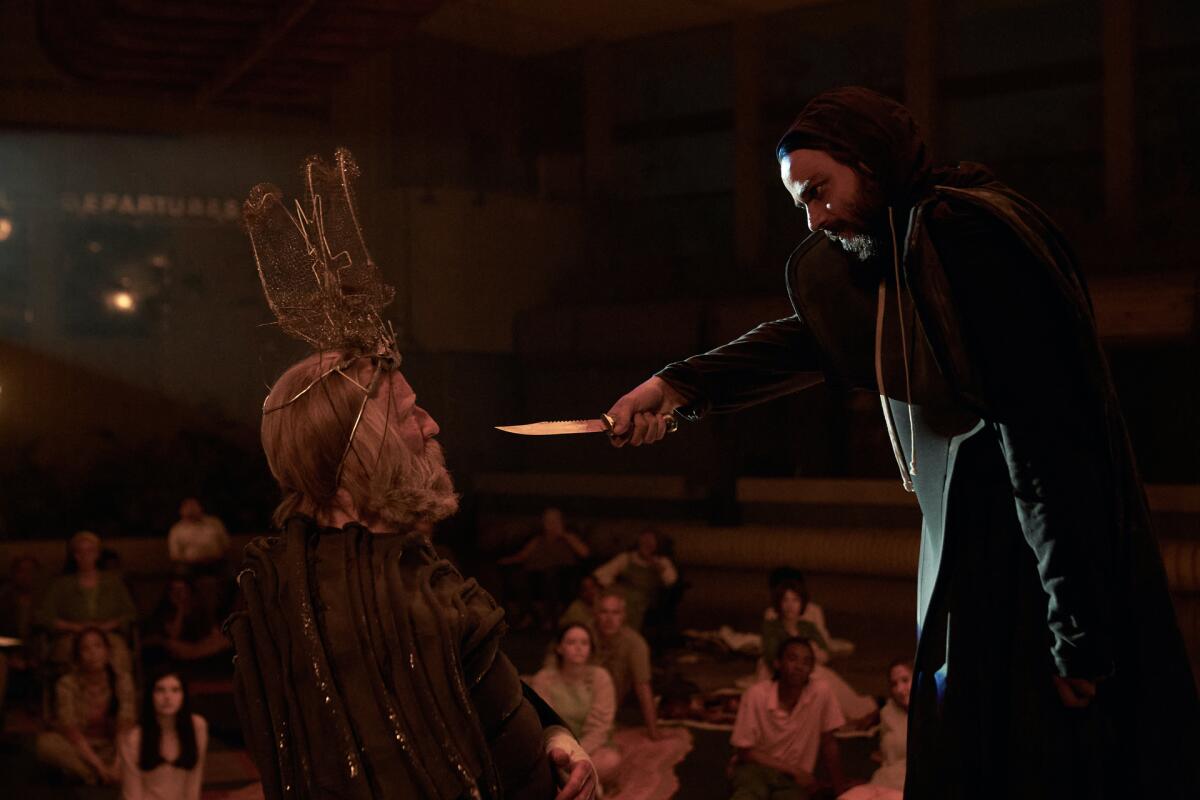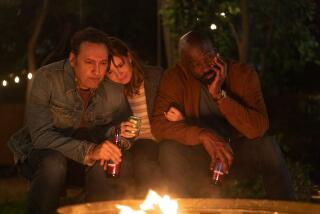How a spirit of optimism shines through the post-apocalyptic ‘Station Eleven’

- Share via
Across the multiverse of post-apocalyptic dramas, zombie hayrides and dystopian fables streaming throughout the pandemic, HBO Max’s “Station Eleven” felt singular. The series, adapted from Emily St. John Mandel’s 2014 novel about survivors of a cataclysmic viral outbreak, offered something buoyant and rare: a spirit of optimism.
Patrick Somerville, the show’s creator, saw the story as a necessary counterpoint to all the doom and mayhem.
“You can have grand ideas about the world ending, but it’s gotten a little bit boring, especially in Hollywood,” Somerville said in a recent video call. “Emily’s book is so cool because the stakes were always at the human level.”
A novelist who wrote for “The Leftovers” and went on to make the satirical sci-fi tilted shows “Maniac” and “Made for Love,” Somerville had an issue to address. “I thought something was wrong with the mathematics of the storytelling in the genre. It’s a cheat almost to hook everyone. If you start with billions of deaths, the stakes can’t possibly be whether or not the people are going to survive, because you started the story by saying everyone dies.”
“Station Eleven” toggles across decades, between pre- and post-contagion, amid the shifting perspectives of multiple characters, all somehow connected to Hollywood actor Arthur Leander (Gael García Bernal), who is stricken dead by the plague while performing as King Lear. Much of the story follows a nomadic Shakespeare troupe (the Traveling Symphony) as it circles Lake Michigan 20 years later, reaffirming humanity and sparking joy among the ruins through its Bard-meets-Mad-Max scrapyard stagings.
Matilda Lawler and Mackenzie Davis play the lead character -- young and grown -- who travels the post-apocalyptic landscape performing Shakespeare plays for survivors.
The players are stalked by a dangerous cult leader called the Prophet (Daniel Zovatto; played as the child Tyler by Julian Obradors) who has a mysterious kinship with the troupe’s lead performer Kirsten (Mackenzie Davis; played as a child by Matilda Lawler), both in thrall since childhood to a rare graphic novel, “Station Eleven,” whose text has inspired radically different interpretations. Playful cultural references abound, from the heroic speech in “Independence Day” to the funk jams of Parliament, as the show above all argues, Somerville said, for “the insistence of imagination as being inherently more powerful than anything.”
To get there, Somerville made key changes to the source material, most notably the expansion of Himesh Patel’s role as Jeevan, who becomes a surrogate father to the child Kirsten, and even more essential to the writer’s revision of the story, a new iteration of the Prophet. No longer purely villainous, the character becomes more sympathetic and complex. “Our Tyler was a different Tyler,” Somerville said. “Once we met and cast Danny, it became very clear how to make it work tone-wise. He has a gentleness and childlike softness to him but he also has an intimidating masculinity. … He had a very nuanced point of view about who Tyler was.”
Cold weather on the Ontario location pushed latter episodes — shot inside the airport set where all the action converges — to the front of the production schedule. “We went kind of backwards,” said Zovatto, who jumped into the deep end as the troupe presents one of Shakespeare’s most iconic plays in a sprawling airport that has become a micro-society of survivors. The scenes mark one of the show’s climactic emotional peaks. “‘By the way, you’re going to be playing Hamlet.’ OK, cool. That’s exactly what anyone wants to hear two weeks before shooting.”
The biggest challenge of all, of course, was managing most of the production during the COVID-19 pandemic. Yet the circumstances “really brightened and sharpened and deepened the emotional impact,” Somerville said. “It felt like there were too many feelings to feel. The community that was the show was mimicking what the show was about.”
Cast and crew had to forgo the usual social rituals that make extended location shoots feel like summer camp. “Because [the shoot] was the only activity we had other than being in your hotel room,” Zovatto said, “when we were there we were embracing the fact that we could be together amongst ourselves.”
Somerville’s time in “The Leftovers” writers room continues to guide him. “I learned on that show that anything’s possible on TV if you have the right pitch,” he said. “Sometimes we made it impossible on ourselves, but we always found a way.” “Station Eleven” satisfied the polar mandates of his creative aesthetic. “I’m really, really drawn to extremely grounded realism with microscopic epiphanies baked into the writing, and I’m drawn to death stars blowing up.”
By daring to create a “post-apocalyptic show about joy,” Somerville suggests the answer to a loaded question. “What if people don’t eat each other?”
More to Read
From the Oscars to the Emmys.
Get the Envelope newsletter for exclusive awards season coverage, behind-the-scenes stories from the Envelope podcast and columnist Glenn Whipp’s must-read analysis.
You may occasionally receive promotional content from the Los Angeles Times.











